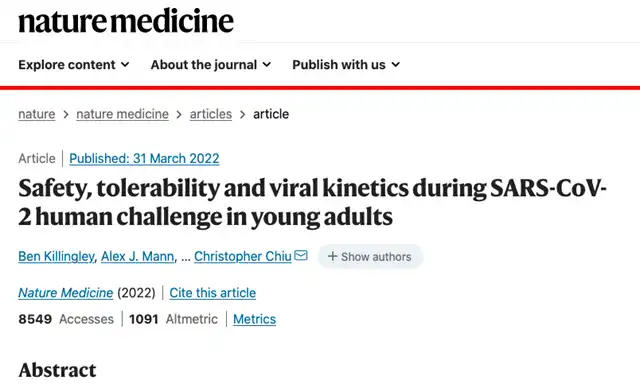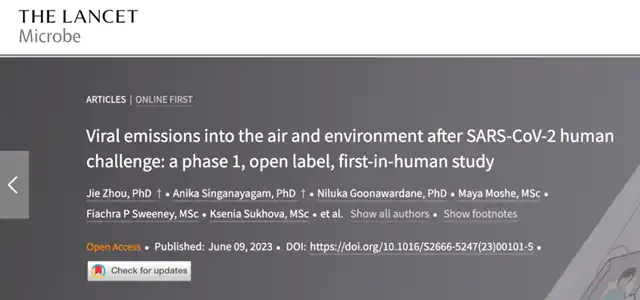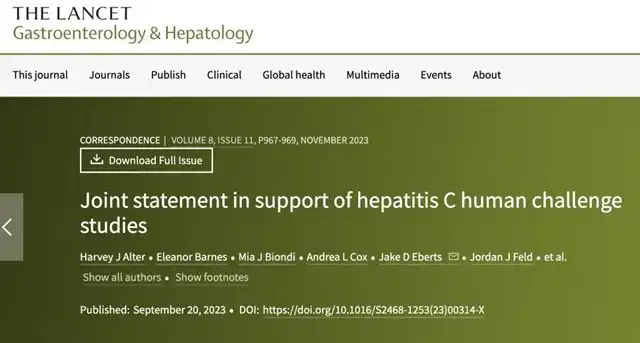Non-Profit Offers $20000 per Person for Zika and Hepatitis C Virus Infections
- Normal Liver Cells Found to Promote Cancer Metastasis to the Liver
- Nearly 80% Complete Remission: Breakthrough in ADC Anti-Tumor Treatment
- Vaccination Against Common Diseases May Prevent Dementia!
- New Alzheimer’s Disease (AD) Diagnosis and Staging Criteria
- Breakthrough in Alzheimer’s Disease: New Nasal Spray Halts Cognitive Decline by Targeting Toxic Protein
- Can the Tap Water at the Paris Olympics be Drunk Directly?
Controversial Human Challenge Trials: Non-Profit Offers $20000 per Person for Zika and Hepatitis C Virus Infections
- Should China be held legally responsible for the US’s $18 trillion COVID losses?
- CT Radiation Exposure Linked to Blood Cancer in Children and Adolescents
- FDA has mandated a top-level black box warning for all marketed CAR-T therapies
- Can people with high blood pressure eat peanuts?
- What is the difference between dopamine and dobutamine?
- How long can the patient live after heart stent surgery?
Controversial Human Challenge Trials: Non-Profit Offers $20000 per Person for Zika and Hepatitis C Virus Infections
In the midst of the COVID-19 pandemic, voluntary infection in “human challenge trials” has captured global attention, reaching a boiling point with the recent revelation that individuals could earn up to $20,000 for participating in such trials.
Reports from various media outlets, including Nature, highlight that 1 Day Sooner, the non-profit organization that advocated for COVID-19 human challenge trials, is now conducting challenge trials for the Zika virus and plans to initiate similar trials for the hepatitis C virus shortly.
This announcement has reignited discussions on the safety and ethics of clinical trials. Over the past decade, human challenge trials have doubled in number, becoming a normalized practice within the framework of modern medical ethics.
Notably, recent trials, such as the early clinical trials for the R21 malaria vaccine approved by the World Health Organization, involved 66 volunteers allowing mosquitoes carrying malaria parasites to bite them to assess the vaccine’s initial protective efficacy.
Statistics reveal a significant increase in the number of ethically approved human challenge trials globally, with a doubling of trials conducted between 2010 and 2019 compared to 2000 and 2009.
In 2020, 1 Day Sooner, driven by the non-profit organization, secured a £33.6 million grant from the UK government to recruit volunteers at a standard rate of £4,500 per person for COVID-19 human challenge trials. Two research results from this trial have been officially published in Nature Medicine and The Lancet Microbe.


Despite these developments, skepticism and criticism persist within the academic community regarding the necessity and safety of COVID-19 human challenge trials.
Charles Weijer, former chair of the Canadian Bioethics Society, criticized 1 Day Sooner’s research as “chaotic” and “unnecessary,” pointing out that the risks outweigh the benefits, especially considering the availability of natural infection data and vaccine development information at the trial’s initiation.
Controversy surrounds the high compensation of up to $40,000 per volunteer, with concerns that such generous rewards may lead to a “race” for participants, potentially causing shortages in other clinical trials.
Critics argue that excessive compensation might downplay the risks associated with human challenge trials and even attract “professional subjects.”
Seema Shah, Associate Professor at the Northwestern University Feinberg School of Medicine and Director of Research Ethics at Lurie Children’s Hospital in Chicago, believes that COVID-19 human challenge trials have not yielded the expected results and suggests that 1 Day Sooner should focus on addressing recruitment challenges in COVID-19 vaccine clinical studies, particularly for special populations like pregnant women.

Offering a maximum reward of $20,000, 1 Day Sooner is preparing to launch a human challenge trial for the hepatitis C virus in 2024.
Experts express concerns about the potential risks associated with this trial, emphasizing that the brief duration of infection and the spontaneous clearance of approximately 25% of hepatitis C virus infections may hinder the evaluation of the vaccine’s efficacy.
Additionally, ethical concerns arise due to the trial’s foundation on newly introduced direct-acting antiviral drugs, despite their high cure rates; concerns about viral resistance to these drugs are increasing.

To address these concerns, 1 Day Sooner organized a joint statement from 121 industry experts, including five Nobel laureates, published in The Lancet Gastroenterology & Hepatology, supporting the safety of hepatitis C human challenge trials in the era of direct-acting antivirals. The statement argues that human challenge trials, under controlled conditions, can significantly accelerate vaccine development for hepatitis C.
Furthermore, 1 Day Sooner plans to compensate volunteers who complete a 6-month follow-up with up to $20,000, an unprecedented amount in human challenge trial history. While concerns about the high compensation potentially complicating ethical reviews persist, a survey released by 1 Day Sooner indicates that registered volunteers support the hepatitis C virus challenge trial out of “altruism,” with most participants believing that this motivation is not in conflict with receiving substantial compensation.
Controversial Human Challenge Trials: Non-Profit Offers $20000 per Person for Zika and Hepatitis C Virus Infections
References:
[1]Callaway E. These volunteers want to be infected with disease to aid research – will their altruism help? Nature. 2023. doi: 10.1038/d41586-023-03583-5
[2]White RM. Effects of untreated syphilis in the negro male, 1932 to 1972: a closure comes to the Tuskegee study, 2004. Urology. 2006;67(3):654. doi: 10.1016/j.urology.2005.08.025
[3]Marshall BJ, Armstrong JA, McGechie DB, et al. Attempt to fulfil Koch’s postulates for pyloric Campylobacter. Med J Aust. 1985;142(8):436-9. doi: 10.5694/j.1326-5377.1985.tb113443.x
[4]Datoo MS, Natama MH, Somé A, et al. Efficacy of a low-dose candidate malaria vaccine, R21 in adjuvant Matrix-M, with seasonal administration to children in Burkina Faso: a randomised controlled trial. Lancet. 2021;397(10287):1809-1818. doi: 10.1016/S0140-6736(21)00943-0
[5]Adams-Phipps J, Toomey D, Więcek W, et al. A Systematic Review of Human Challenge Trials, Designs, and Safety. Clin Infect Dis. 2023;76(4):609-619. doi: 10.1093/cid/ciac820
[6]Killingley B, Mann AJ, Kalinova M, et al. Safety, tolerability and viral kinetics during SARS-CoV-2 human challenge in young adults. Nat Med. 2022;28(5):1031-1041. doi: 10.1038/s41591-022-01780-9
[7]Marsh AA, Magalhaes M, Peeler M, et al. Characterizing altruistic motivation in potential volunteers for SARS-CoV-2 challenge trials. PLoS One. 2022;17(11):e0275823. doi: 10.1371/journal.pone.0275823
[8]Lenharo M. Scientists deliberately gave women Zika – here’s why. Nature. 2023;623(7985):18. doi: 10.1038/d41586-023-03289-8
[9]https://medicalxpress.com/news/2023-03-human-trials-vaccine.html
[10]Paz-Bailey G, Rosenberg ES, Sharp TM. Persistence of Zika Virus in Body Fluids – Final Report. N Engl J Med. 2019;380(2):198-199. doi: 10.1056/NEJMc1814416
[11]Nicastri E, Castilletti C, Liuzzi G, et al. Persistent detection of Zika virus RNA in semen for six months after symptom onset in a traveller returning from Haiti to Italy, February 2016. Euro Surveill. 2016;21(32):30314. doi: 10.2807/1560-7917.ES.2016.21.32.30314
[12]Bhatia M, Gupta E. Emerging resistance to directly-acting antiviral therapy in treatment of chronic Hepatitis C infection-A brief review of literature. J Family Med Prim Care. 2020;9(2):531-538. doi: 10.4103/jfmpc.jfmpc_943_19
[13] Alter H J, Barnes E, Biondi M J, et al. Joint statement in support of hepatitis C human challenge studies[J]. The Lancet Gastroenterology & Hepatology, 2023, 8(11): 967-969.
(source:internet, reference only)
Disclaimer of medicaltrend.org
Important Note: The information provided is for informational purposes only and should not be considered as medical advice.



